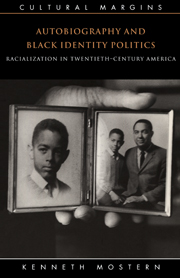Book contents
- Frontmatter
- Contents
- Acknowledgments
- Part one: Theorizing race, autobiography, and identity politics
- Part two: The politics of Negro self-representation
- Part three: The dialectics of home: gender, nation, and blackness since the 1960s
- 6 Malcolm X and the grammar of redemption
- 7 The political identity “woman” as emergent from the space of Black Power
- 8 Home and profession in black feminism
- Notes
- Works cited
- Index
6 - Malcolm X and the grammar of redemption
Published online by Cambridge University Press: 02 December 2009
- Frontmatter
- Contents
- Acknowledgments
- Part one: Theorizing race, autobiography, and identity politics
- Part two: The politics of Negro self-representation
- Part three: The dialectics of home: gender, nation, and blackness since the 1960s
- 6 Malcolm X and the grammar of redemption
- 7 The political identity “woman” as emergent from the space of Black Power
- 8 Home and profession in black feminism
- Notes
- Works cited
- Index
Summary
Every Negro boy – in my situation during those years, at least – who reaches this point realizes at once, profoundly, because he wants to live, that he stands in great peril and must find, with speed, a “thing,” a gimmick, to lift him out, to start him on his way. And it does not matter what the gimmick is … It was my career in the church that turned out, precisely, to be my gimmick.
James BaldwinProbably about 90 percent of young people get their first introduction to black history through the Autobiography [of Malcolm X].
Deidre BaileyThat feels like truth to me.
Patricia WilliamsIntroduction
This chapter hypothesizes two things that cannot be proven. Yet much of the narrative presented in the three previous chapters has been constructed to make them plausible, and the two concluding chapters, which concern the potentiality for the emergence of a large-scale feminist resignification of the present grammar of racialization, are written in the wake of these hypotheses. Put briefly, they are follows:
It makes sense to view The Autobiography of Malcolm X as simultaneously reflective and productive of the mass cultural structure of feeling which emerged as “blackness” in the mid–1960s. Inasmuch as the period 1956–74 can be said to be the moment of the greatest alteration – which in no way should be read as “diminution” – in racial consciousness in the twentieth century, it follows that an understanding of the precise contours of this autobiography as educational narrative, as narrative of gendering, and as narrative of the conditions of possibility of freedom, is a necessary element in the analysis of the moment of racialization we now inhabit.
[…]
- Type
- Chapter
- Information
- Autobiography and Black Identity PoliticsRacialization in Twentieth-Century America, pp. 137 - 163Publisher: Cambridge University PressPrint publication year: 1999



